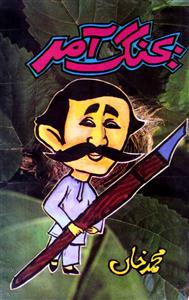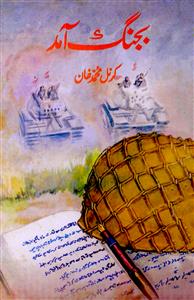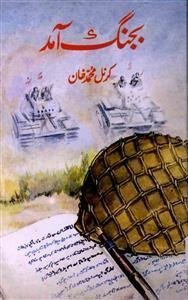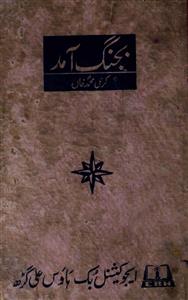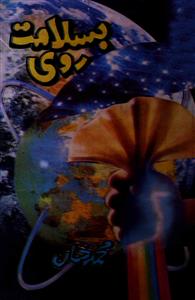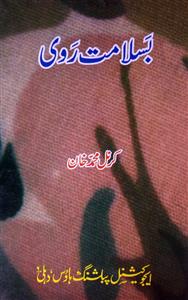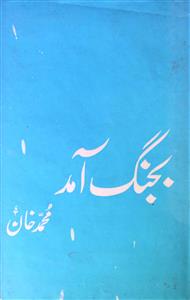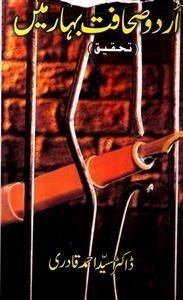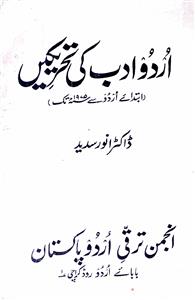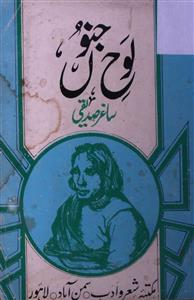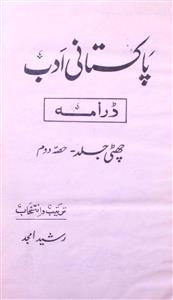 For any query/comment related to this ebook, please contact us at haidar.ali@rekhta.org
For any query/comment related to this ebook, please contact us at haidar.ali@rekhta.org
About The Book
یہ کتاب اردو ادب کے مشہور و معروف مزاح نگار کرنل محمد خان کی زمانۂ جنگ کی گزاری ہوئی زندگی کی داستان پر مبنی کتاب ہے۔ اس کتاب میں جہاں بہت سی ہونی اور ان ہونیوں کا ذکر ہے، جہاں بہت سے پر لطف یادگار اور قابل ذکر واقعات، ادوار اور یارانِ دلدار کا ذکر ہے وہاں انہوں نے اپنی اس کتاب کی معرفت اور اپنی خوش بیانی کی بنا پر ان کی ایسی تصویر کھینچی ہے کہ اس نے ان سب کو داستانِ جاوداں بنا دیا ہے، ممتاز مزاح نگار سید ضمیر جعفری کتاب کے بارے میں فرماتے ہیں، “کہ انسانوں کی طرح کتابیں بھی قسما قسم کی ہوتی ہیں۔ مثلاً “بزرگ کتابیں”، “نادان کتابیں” وغیرہ وغیرہ۔ “بجنگ آمد” ایک “دوست کتاب” ہے یعنی ایسی کتاب جس پردل ٹوٹ کر آجائے۔ جس کے ساتھ وقت گزار کر آدمی دلی راحت محسوس کرے۔ جس سے بار بار گفتگو کرنے کو جی چاہے۔ دوست، جو خوش رو بھی ہے، خوش مذاق بھی۔ شوخ بھی ہے اور دلنواز بھی۔ ذہین بھی ہے اور فطین بھی اور ہنس مکھ اتنا کہ جب دیکھے ہونٹوں پر ہنسی آئی ہوئی ہو۔"
About The Author
Colonel Mohammad Khan is one of the few satirists in Urdu literature who has written literature for the sake of life, instead of literature for the sake of literature. He was a renowned satirist and director of the Pakistan Army's Department of Education. In the history of Urdu satire, Colonel Mohammad Khan's work deserves serious attention because his writings are not just a means of passing time but are thought-provoking. He has enriched Urdu literature with the exemplars of meditated satire in the form of "Ba-Jang Amad", "Ba-salamat Ravi", and "Bazm Araiyan". Colonel Mohammad Khan's style is characterized by his creativity, thoughtfulness and eloquence which sets him apart from other satirists. He was a contemporary of Mushtaq Ahmad Yousifi, Zameer Jafari, and Shafiqul Rehman.
Colonel Muhammad Khan was born on August 5, 1910 in the town of Blixar, Chakwal District, Punjab Province in the house of Chaudhry Amir Khan. In 1927, he passed 10th class in First Division and obtained the Roll of Honor. In 1929, he passed FSC Medical Group in first class, followed by, BA, in 1931. After that he got BA Honors degree in Persian. Perhaps this was the time when his aptitude of literature, language, and culture encouraged. He enrolled in Punjab University for MA (Economics) degree which he obtained in 1934. He joined the Army in 1940 and in 1957 became the Director of Army Education and retired in 1969 while holding the same post.
His major works include Ba-jang Amad (1966), Ba-salamat Ravi (1975), Bazm Araiyan (1980) and Bidesi Mizaah. He died on October 23, 1991.
 For any query/comment related to this ebook, please contact us at haidar.ali@rekhta.org
For any query/comment related to this ebook, please contact us at haidar.ali@rekhta.org
